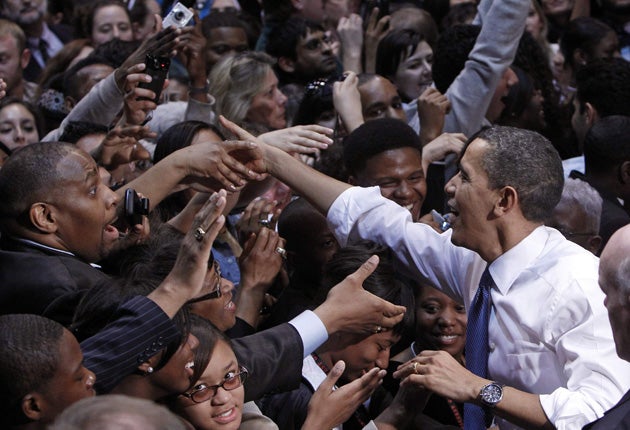Obama embarks on final push for healthcare votes
President still short of majority ahead of crucial Congressional vote on reforms tomorrow

The US House of Representatives is poised for a historic vote tomorrow that could bring into law the biggest changes to the country's healthcare system in half a century, and transform Barack Obama's presidency.
If approved, the $940bn measure – the climax of a battle that has consumed US politics for nine months – would provide insurance to 32 million more Americans, extending healthcare coverage to 95 per cent of the population. It would impose new taxes on wealthy and well-insured, and impose new rules on the insurance industry.
Most uncovered individuals will now be obliged to buy insurance, the less well-off among them with the help of federal subsidies. In return for the extra customers, the insurance companies will be barred from their most controversial practices, of refusing coverage to those with pre-existing conditions, and arbitrarily withdrawing coverage from patients.
But the battle will continue up to the very end. With Republicans unanimously opposed to the measure, the fate of the legislation hinges on some two dozen undecided Democrats. Though Democratic leaders claimed the momentum was running their way, as of last night they were still short of the 216 votes needed for a majority and passage of the Bill.
Yesterday, President Obama, jacket off and shirt-sleeves rolled up, delivered a final impassioned appeal for reform at George Mason University in suburban Virginia. For a century, presidents since Teddy Roosevelt had been trying to provide coverage for all, he said, "now we are at the point where we are going to do something historic this weekend". The debate was "about the character of our country".
Mr Obama continued: "What we're talking about is commonsense reform. "If this Bill fails, the insurance industry will continue to run amok. Are we going to let special interests win? Or are we going to make this a victory for the American people?"
So high are the stakes that Mr Obama has cancelled a long-planned trip to Indonesia and Australia that was to have started tomorrow. Instead he has been personally lobbying wavering Democrats, inviting individual lawmakers to the Oval Office for 15-minute pep-talk sessions, to try to win them over.
The Republicans are adamantly and utterly opposed. "We will do everything in our power to make sure that this Bill never, ever, ever passes," said John Boehner, the Republican minority leader in the House. He and his colleagues were plotting last-ditch procedural traps to try to capsize the measure.
Under the tortuous legislative process forced on Democrats by the loss of their filibuster-proof 60th seat in the Senate (when Republicans captured Edward Kennedy's old seat in Massachusetts), the House must now pass in its entirety the Bill approved by the Senate in December. That measure will then go to Mr Obama for signature.
But in fact, the House tomorrow will not be voting explicitly on the Senate Bill. Instead – in a manoeuvre that enrages Republicans – it will be "deemed passed" if the House votes to approve a package of other changes to be sent to the Senate. These are designed to meet other House objections to the original Senate measures. But they will be dressed up as budget-related changes that come under so-called "reconciliation" rules that need a simple majority of 51 votes, not 60. If passed in the Senate, this reconciliation Bill will also be sent to Mr Obama for signature.
Either way, Democrats still need 216 votes, and the pressure on waverers only intensified as yesterday wore on. By one early-afternoon estimate, the certain "No" votes totalled 206: all 178 Republicans, plus 28 Democrats. Everything depended on 20 or 30 House Democrats still officially undecided.
Their misgivings range from the objections of social conservatives to abortion language in the Senate version, which they say could permit government-backed coverage for terminations, to complaints that the Bill costs too much when the country faces $1trn budget deficits. Some vulnerable Democrats are simply scared that a "Yes" vote will cost them their seats in November's mid-term elections.
But the abortion fears have been allayed partly by the support of Catholic nuns and other religious orders for the overall Bill, and an even bigger fillip has been provided by estimates from the Congressional Budget Office, the traditionally neutral budget score-keeper. The CBO reckons the measure will cost $940bn over 10 years. But it will reduce the budget deficit by $138bn over that period, and by $1.2trn in the decade after.
The wider public remains divided. A Wall Street Journal/NBC poll found only 46 per cent of Americans in favour of reform, with 45 per cent against.
Explainer: Where we are now
Is this really the last hurdle for the healthcare Bill?
Yes. After endless twists and turns, Sunday's vote is the definitive judgement. If the Bill passes, it will quickly enter law. If it falls, it falls for good.
Didn't they already vote on this?
They did. But while both the Senate and the House of Representatives have passed versions of the Bill, they have not yet merged the two.
Why not?
To overcome procedural hurdles, and get their preferred Bill, The Democrats needed 60 votes in the Senate, but the death of Senator Edward Kennedy and his replacement by a Republican deprived them of that.
So what did they do instead?
They had to send the less radical Senate Bill back to the House for endorsement. They propose to use the "reconciliation" process when it finally returns to the Senate, which needs only 51 votes. In the simplest terms, the Democrats' initial plans have proven too radical; by watering down their proposals, they hope to get the Bill passed with the smaller number of votes they now command.
Join our commenting forum
Join thought-provoking conversations, follow other Independent readers and see their replies
Comments
Bookmark popover
Removed from bookmarks